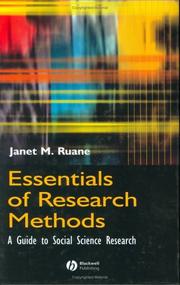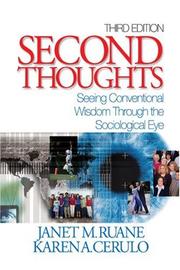| Listing 1 - 7 of 7 |
Sort by
|

ISBN: 0631230483 0631230491 Year: 2005 Publisher: Oxford Blackwell
Abstract | Keywords | Export | Availability | Bookmark
 Loading...
Loading...Choose an application
- Reference Manager
- EndNote
- RefWorks (Direct export to RefWorks)
Social sciences --- Sciences sociales --- Research. --- Statistical methods. --- Recherche --- Méthodes statistiques
Book
ISBN: 9781118874240 9781118874257 1118874250 1118874242 Year: 2016 Publisher: Malden, Mass. Wiley Blackwell
Abstract | Keywords | Export | Availability | Bookmark
 Loading...
Loading...Choose an application
- Reference Manager
- EndNote
- RefWorks (Direct export to RefWorks)
Introducing Social Research Methods: Essentials for Getting the Edge offers a concise, student-friendly introduction to research methods that represents a refreshing alternative to the dense tomes too focused on the minutiae of methodologies to appeal to novices or outsiders. Janet Ruane, a respected author with more than 25 years' experience teaching social science research methods, provides detailed explanations of methodologically complex concepts written in straightforward and engaging prose. Each chapter features specific everyday examples from around the world that demonstrate the relevance and informative potential of social science methods. The text includes a range of pedagogic features, from lists of key points to boxes highlighting the relevance of social science research in interpreting current events, while the companion website offers further tools for instructors and students, including a glossary of key terms, a test bank, PowerPoint presentations, a comprehensive list of web resources, and more. Specifically designed for students who are new to, or skeptical of, social science, Introducing Social Research Methods: Essentials for Getting the Edge persuasively argues for the real-world value of understanding social research methods and the benefits of the broader perspective gained from understanding this fundamental field. --Book Jacket.

ISBN: 9780631230489 9780631230496 Year: 2006 Publisher: Malden Blackwell
Abstract | Keywords | Export | Availability | Bookmark
 Loading...
Loading...Choose an application
- Reference Manager
- EndNote
- RefWorks (Direct export to RefWorks)

ISBN: 0761988246 Year: 2004 Publisher: Thousand Oaks (Calif.) Pine Forge
Abstract | Keywords | Export | Availability | Bookmark
 Loading...
Loading...Choose an application
- Reference Manager
- EndNote
- RefWorks (Direct export to RefWorks)
Book
ISBN: 9781452299495 Year: 2015 Publisher: Los Angeles, Calif. Sage
Abstract | Keywords | Export | Availability | Bookmark
 Loading...
Loading...Choose an application
- Reference Manager
- EndNote
- RefWorks (Direct export to RefWorks)
Methods in social research (general) --- Sociology of knowledge --- History as a science --- sociology --- sociologie
Book
ISBN: 1506345816 1506345808 1506345778 1506345786 9781506345819 9781506345802 9781506345772 9781506345789 Year: 2020 Publisher: Thousand Oaks, California : SAGE Publications, Inc.,
Abstract | Keywords | Export | Availability | Bookmark
 Loading...
Loading...Choose an application
- Reference Manager
- EndNote
- RefWorks (Direct export to RefWorks)
Introducing students to core sociological concepts by debunking popular misconceptions Is it true that “numbers don’t lie?” Is America “the land of equal opportunity?” Is marriage a “dying institution?” Oft-repeated adages like these shape our beliefs about the society we live in. Each essay in Second Thoughts reviews a conventional wisdom familiar to both instructors and students. The authors introduce relevant sociological concepts and theories in order to explain, qualify, and sometimes debunk that conventional wisdom. This unique text encourages students to step back and sharpen their analytic focus. 23 engaging essays reveal the complexity of social reality and demonstrate the role of sociology in everyday life.
Sociology. --- Sociology
Book
ISBN: 0691229082 Year: 2022 Publisher: Princeton, New Jersey ; Woodstock, Oxfordshire : Princeton University Press,
Abstract | Keywords | Export | Availability | Bookmark
 Loading...
Loading...Choose an application
- Reference Manager
- EndNote
- RefWorks (Direct export to RefWorks)
"We are told that, in dreaming, anything is possible. Dreams are imaginings that are not supposedly linked to concrete experience or action or inhibited by the social and political disadvantages that may come from one's class position, race, ethnicity, or gender. They do not articulate a roadmap for achievement or a path to a specific end in the way that aspirations or projects do. They are mental exercises that provide a vision of a person's inner self and desired identity. In this book, Karen Cerulo and Janet Ruane interrogate what it means to dream, what our dreams look like, and whether our social location impacts what, when, how, and if we dream. Drawing on data from interviews and focus groups with 272 people from different social backgrounds, the authors argue that while dreams are generally treated as personal and unique, they are quite clearly patterned in very predictable ways. People's dreams differ from age to age, group to group, and context to context, and the chapters focus on different subsets of the study participants. After examining how race, class, and gender impact dreaming, the authors examine different life stages and finally those who have faced "ruptures" in their life stories. In Dreams of a Lifetime, the authors conclude that dreams represent the starting point of our perception of "fit"; they tell the story of where we think we belong, what life paths we consider taking, and what we think we deserve before that story is lived. And that story is built from the cultural lessons to which we are exposed in our daily social interactions and the cultural contexts in which we live."--
Desire. --- Dreams. --- Ambition. --- Fantasy. --- Self-actualization (Psychology) --- Identity (Psychology) --- Abdomen. --- Addition. --- Americans. --- Amphisbaenia. --- Anatomy of Hope. --- And babies. --- Ann Swidler. --- Appendage. --- Asexual reproduction. --- Budding. --- Career. --- Certification. --- Cess. --- Cestoda. --- Coccyx. --- Comrade. --- Concept. --- Consciousness. --- Copayment. --- Cultural capital. --- Culture. --- Designer. --- Dream Story. --- Duke University Press. --- Employment. --- Entrepreneurship. --- Evolution. --- Evolutionary developmental biology. --- Extracurricular activity. --- Family. --- Finding. --- Fixed income. --- Focus group. --- Forelimb. --- Germline. --- Graduation Rate. --- Graduation. --- History. --- Hymenoptera. --- I Wish (manhwa). --- Illustration. --- Imagination. --- Income. --- Intention. --- Invention. --- Laborer. --- Lamarckism. --- Life satisfaction. --- Livelihood. --- Living wage. --- Long Term. --- Longitudinal study. --- Make A Difference. --- Marital status. --- Medalist. --- Middle class. --- Month. --- Most recent common ancestor. --- Narrative. --- Need for achievement. --- Nemertea. --- Net worth. --- Obligation. --- Obstacle. --- Optimism. --- Ovipositor. --- Ownership. --- Percentage. --- Personal experience. --- Phylum. --- Plymouth Colony. --- Prediction. --- Probability. --- Productivity. --- Profession. --- Publication. --- Quality Education. --- Quality time. --- Queen for a Day. --- Race (human categorization). --- Requiem for a Dream. --- Respondent. --- Result. --- School of thought. --- Second Life. --- Sept. --- Sexual maturity. --- Social class. --- Social space. --- Spouse. --- Student. --- Support group. --- The Iconic. --- Their Lives. --- Thought. --- Treatise. --- Ulna. --- Uncertainty. --- Upper class. --- Wealth.
| Listing 1 - 7 of 7 |
Sort by
|

 Search
Search Feedback
Feedback About UniCat
About UniCat  Help
Help News
News